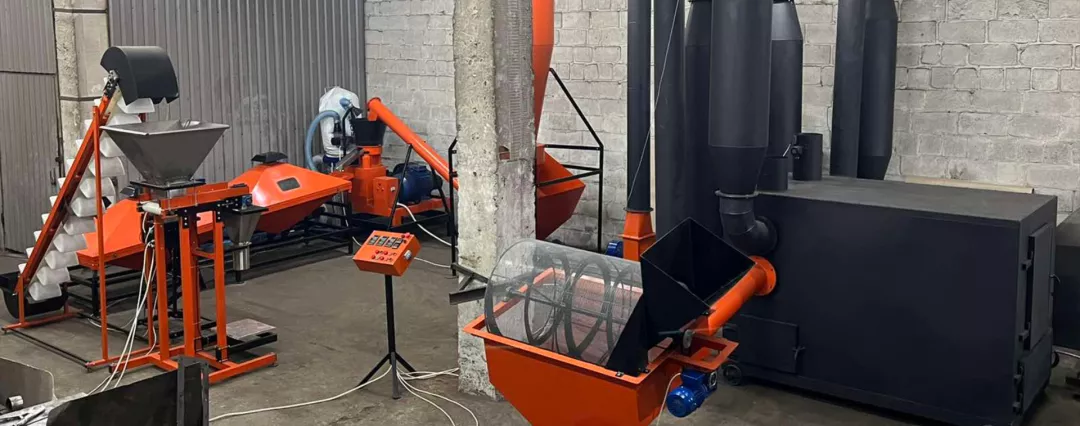General information
RDP Priority
- P6. Social inclusion and local development
RDP Focus Area
- 6B: Local development
RDP Measure
- M19: LEADER/CLLD
Beneficiary type
- Farmer / land manager
Summary
Andreea Ciobanu set up her vegetable farm in the village Bălești in 2016. Every year, her farm produced tonnes of vegetable residue waste, which she had been leaving on the field. Transforming this waste into commercial briquettes for heating created two new jobs and proved to be a profitable business because demand for fuel is high in rural areas not connected to public home heating networks. Briquettes can replace the use of firewood in wood-burning boilers, stoves, or fireplaces. They have a reduced storage volume and a higher caloric power (38-60%) compared to most ordinary wood. They can produce less residue after burning (ash 0.5%), are easy to handle and the raw material is 100% natural without binders nor chemical additives. Andreea used LEADER co-funding to set up an entrepreneurial briquette production line reusing her farm’s waste vegetable residues.
Results
- Two people were hired (FTEs).
- Andreea’s fuel briquettes have a greater calorific value and are 20-22% cheaper than natural gas.

Promoter
SC ZMEURIȘUL COASTA NEAGULUI SRL
Funding
Total budget: 90 000 (EUR)
EAFRD: 33 750 (EUR)
National/Regional: 11 250 (EUR)
Private/own: 9 000 (EUR)
EURI funds: 36 000 (EUR)
Ressourcen
Documents
Context
The Zmeurișul Coasta Neagului fruit farm was established in the village of Bălești, in the Cozmești commune of Vaslui County, in January 2016. Vaslui County’s economy is predominantly agrarian and, in 2023, had the lowest GDP per capita in Romania. This is an indicator that reflects economic performance and productivity and is mirrored in purchasing power and standard of living.
The manager of the Zmeurișul Coasta Neagului fruit farm is Andreea Ciobanu, who is an economist by profession. Initially, her farm had 0.25 acres of raspberry and blackberry crops, and this has grown over the years to approximately 2.5 hectares. Andreea came up with the idea of producing briquettes when thinking about the need to diversify her farm’s income and, at the same time, thinking about how best to manage the disposal of the increasing amount of plant residues.
Briquettes can replace the use of firewood in any wood-burning boiler, stove or fireplace. They have a reduced storage volume and a higher caloric power (38-60%) compared to ordinary wood, they produce less residue after burning (ash 0.5%), they are easy to handle, and the raw material is 100% natural without binders and chemical additives.
Using briquettes for heating also has other environmental benefits. Plant waste residues are effectively reused and environmental pollution is avoided. The emission of harmful substances is limited and the resulting small amount of ash can be used as fertiliser. The raw material, dry agricultural biomass, represents an inexhaustible resource and its exploitation could contribute to the sustainable development of the energy sector and environmental protection.
Objectives
The aims of this project were to:
- Produce briquettes using the waste plant residues from the vegetable farm.
- Create new employment opportunities for local people in the circular bioeconomy.
- Create a website for marketing the company's circular economy products.
Activities
The farm used CAP support granted by the Movila Lui Burcel Vaslui Nord Local Action Group to finance the following activities:
- Constructing, expanding and/or modernising the buildings to host briquette production.
- Purchasing and installing new machinery, tools and equipment, (including IT) and a specialised vehicle.
- Procuring software and acquiring the necessary patents.
- Setting up the space and purchasing the necessary infrastructure, including setting up an office for administration and purchasing a computer and a printer, shelves, and pallets for storage, etc.
- Purchasing the pellet production line, which consisted of a briquette press, branches and plant debris shredder, dryer, table with bag glueing device and scale, and moisture meter for chopping straw and sawdust.
- Obtaining operating permits and authorisations from the Inspectorate for Emergency Situations (ISU), Environment, Environmental Guard, Public Health.
- Hiring and training staff and ensuring the safety of working conditions.
- Starting a promotional campaign marketing the new product to the nearest potential customers.
Main results
- In Romania, less than 30% of the rural population benefits from natural gas. The farm’s product has a greater calorific value and a lower price (20-22%) than the wood they typically use for heating.
- Two people were hired to work on briquette production (FTEs).
Key lessons
- Alternative fuel options from circular economy sources can provide business diversification opportunities on farms.
- The success of this investment relied on the existence of a large amount of agricultural and forestry raw material in the area, especially from the business owner’s vegetable farm. Another important factor has been the increase in demand for briquettes as fuel for both domestic and industrial consumption.
My farm diversification was an opportunity to access LEADER for producing briquettes from vegetable residues. It was a natural move following my other CAP-funded farm developments. For instance, I respect Romanian culinary traditions, that's why I started to produce and test products derived from forest fruits: jams, preserves, syrups and other traditional preparations. I believe that small producers are vital for the local economy, so I want to help promote and capitalise on good quality Romanian products and rediscover the agri-ecological potential of Romania, and of Vaslui County. Coasta Neagului raspberry jam is now the first certified traditional product in Vaslui and the 675th certified traditional product in Romania.
